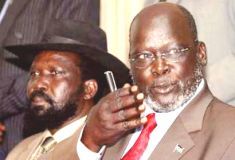Leaders pledge unity to end militia activities in southern Sudan
NAIROBI, Apr 19, 2005 (Xinhua) — Southern Sudanese leaders attending a conference in Nairobi aimed at promoting post-war reconciliation between fractious factions have pledged to promote peace and unity to rid the vast region off militia activities.

|
|
Sudan’s People Liberation Army leader John Garang (R), flanked by his deputy Commander Salva Kiir Majardit, answers a question during an SPLA press conference in Kenya’s capital Nairobi, January 8, 2005. (Reuters). |
Sudan People’s Liberation Movement/Army (SPLM/A) leader John Garang and Sudan’s Second Vice President Moses Machar on Tuesday appealed for unity and reconciliation among the southerners.
“The people of southern Sudan have for a very long time waited for this peace. It would be treacherous for us to throw it away because we think we have differences of personal interests at stake,” Machar told over 200 delegates including representatives from the former rebel force and Khartoum.
Machar said his National Congress Party (NCP) would work together with SPLM/A to put to end militia activities in southern Sudan.
“We in the NCP are in total support of all democratic institutions, characterized by justice, fairness, the rule of law, accountability, transparency and inclusions,” March said.
Garang said the recently signed peace deal offers key solutions to some of the problems the southerners have been fighting for the last 21 years.
“The SPLM/A is fully committed to the dialogue no matter how difficult they are. We are ever ready for dialogue and reconciliation for the common good of our people,” Garang said.
“The comprehensive peace agreement belongs to all the Sudanese people. It doesn’t matter who signed it and it’s your duty to nurture peace and use it for development of southern Sudan,” the SPLM/A leader said.
The three-day conference, dubbed South-South Dialogue, is being convened by Kenyan former president Daniel Arap Moi’s charitable organization, the Moi African Institute (MAI).
The January peace agreement between the main rebel force, the SPLM/A, and the Sudanese government didn’t include other factions from southern Sudan.
Despite the peace deal and the promised aid, tensions remain high between the government, its proxy militias in the south and the SPLM/A.
Many militias have refused to deal with SPLM/A leader who they accuse of being dictatorial.
Major General Paulino Matipu and Brigadier Gabriel Tanginya who command heavily armed militias blamed for abducting hundreds of civilians and imposing illegal taxes in Sudan’s oil rich Upper Nile region were conspicuously absent from the meeting.
Garang blamed the Sudanese government which on Monday promised to rein the groups if they were endangering peace, for the absence.
But civil society representatives expressed optimism the meeting will be able to bridge differences between all sides in the south on the nitty-gritty of the peace deal and devise ways of dividing among them oil revenue that will be shared with the north under a complex formula in the agreement.
According to Suzanne Jambo, the co-coordinator of the New Sudan Indigenous Organizations Network (NESI), the grassroots people want to see the peace agreement implemented and their leaders agree to the issues that have divided southerners for too long.
Moi, who was instrumental in initiating the Sudan peace process that culminated in the historic signing of the comprehensive peace deal between the north and south, called on the southerners to take advantage of billions of dollars in post-war reconstruction aid pledged by donors to collectively develop their vast region.
“I call upon you to utilize the goodwill provided by the international community as demonstrated in the Oslo donors’ conference that took place last week. This will go a long way in promoting and building peace, tranquillity and development in southern Sudan,” he urged.
Southern Sudan was embroiled in civil war for over two decades, leaving about two million people dead and over four million others uprooted from their homes.
